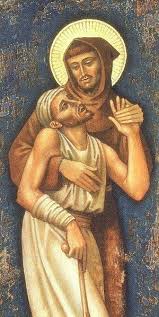Jesus in Disguise
by Br. Bede Thigpen, Order of Friars Minor Conventual and former Kaio Community Member
 As a Franciscan friar, I often hear the story of St. Francis and the leper—a pivotal event in Francis of Assisi’s life. The saint recounts in his own last testament how, as a young man, he was physically repulsed by the residents of a leper colony near his town in central Italy. One day, however, by God’s grace, he overcame his revulsion and embraced one of the lepers, kissed him, and washed his hands and feet. After doing so, the leper disappeared, and Francis realized that the shunned outcast was actually Jesus Christ in disguise.
As a Franciscan friar, I often hear the story of St. Francis and the leper—a pivotal event in Francis of Assisi’s life. The saint recounts in his own last testament how, as a young man, he was physically repulsed by the residents of a leper colony near his town in central Italy. One day, however, by God’s grace, he overcame his revulsion and embraced one of the lepers, kissed him, and washed his hands and feet. After doing so, the leper disappeared, and Francis realized that the shunned outcast was actually Jesus Christ in disguise.
The episode marks St. Francis’s conversion and the beginning of the radical life of joyful poverty for which he is now famous.
Anyone familiar with the work of Emmaus knows that, in many ways, men involved in prostitution are the lepers of our own day, the “outcast among the overlooked.” They are often met with fear, misunderstanding, and condescension. Men, conventional wisdom says, should be able to fend for themselves. Yet, as I discovered while living and working at Emmaus as a member of the Kaio community from 2007 to 2009, Jesus Christ lives in and among these men just as he did among the lepers of 13th-century Assisi.
I found Jesus in Dominick, who was still able to laugh and joke with Outreach volunteers while working a street corner in subzero weather at 2 a.m. with nothing but a thin windbreaker to shield him from the cold. I found Him in Dante who, having escaped the snares of prostitution, was eager to volunteer at the Ministry Center to help those who were still entangled in the life. I found him in Conner, a rambunctious teenager who shocked me when he sat, silent and enraptured, through an hour-long presentation of St. John Paul II’s “Theology of the Body” at Holy Name Cathedral. And I found him in Mark who, despite a history of sexual abuse and a lifetime of ill health, always prayed with a rawness that inspired me.
Ten years later, I still carry these men, living and deceased, in my heart and prayers. Through them I learned the great paradox of ministry: what one gives, he receives back a hundredfold. At Emmaus, I awoke every morning filled with a tremendous sense of gratitude and excitement for the work ahead. What greater job could one have than to spend the day (or night!) with Jesus and his brothers?
It is largely to them, and to the staff at Emmaus, that I owe my vocation as a Franciscan friar. My desire to live a life consecrated to God in the footsteps of the Little Poor Man of Assisi was born and nurtured among the poor men of Emmaus, who are often so rich in the things that matter most.
For that, and to them, I am eternally grateful.
